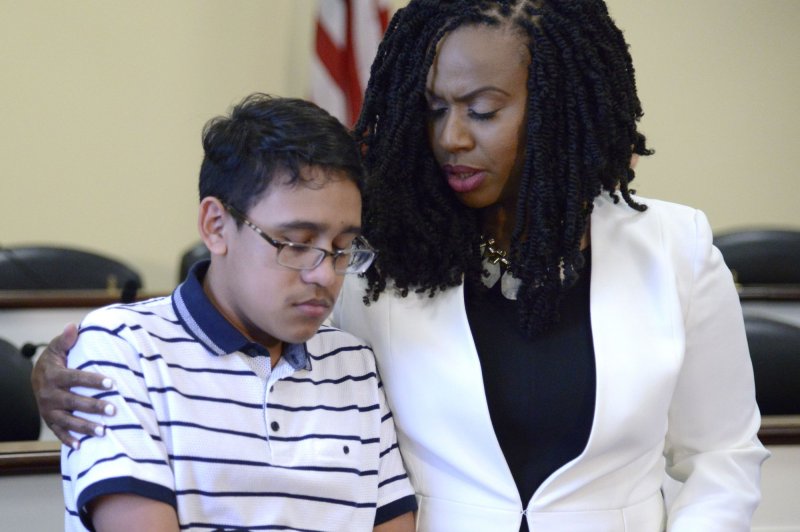1 of 5 | Sixteen-year-old Jonathon Sanchez, of Honduras, is embraced by Massachusetts Rep. Ayanna Pressley Wednesday during a news conference at the U.S. Capitol. Photo by Mike Theiler/UPI |
License Photo
Sept. 11 (UPI) -- House lawmakers heard personal stories Wednesday from several people, including migrants, who said a move by the Trump administration to cut a medical exemption program will be the difference between death and survival in the future for a number of seriously ill children.
The administration ended the program last month without an announcement or time for public comment. Under the change, undocumented migrants can be deported even if they are receiving life-saving medical treatment in the United States.
Teenager Jonathan Sanchez testified before a panel of the House oversight and reform committee, telling lawmakers he came to the United States dying of cystic fibrosis in 2016 to receive care that wasn't available in his native Honduras. He was admitted to Boston Children's Hospital and his condition rapidly improved, but he now has just a few weeks to leave the United States.
"I started crying, telling my mom I don't want to die," the 16 year old said at the hearing, titled, The Administration's Apparent Revocation of Medical Deferred Action for Critically Ill Children. "If I go back to Honduras, I will die.
"I feel disappointed in the U.S. government that they canceled this program. Deporting sick kids like me, it would be legal homicide because my country doesn't offer this kind of treatment."
Guatemalan migrant Maria Isabel Bueso is receiving treatment for Muscopolysaccharidosis, a condition that results in dwarfism, clouded vision, spinal cord compression and other abnormalities. At 7 years old, she arrived to participate in clinical trials she believes will help thousands of others. Bueso, 24, has become an advocate for persons with rare, life-threatening diseases -- but she, too, must leave the United States.
"Doctors told me if I stop the treatment, my health would decline quickly and I would die within months," she said. "I want to live as a human being with hopes and dreams in life. This is a humanitarian issue and our lives depend on it."
Florida Rep. Debbie Wasserman Schultz cited a letter from Bueso's doctor, which said she'll die if she returns to Guatemala.
"I can't imagine, as a parent, the fear I would have for my own children," Schultz said.
Medical and immigration experts also testified in support of the canceled program Wednesday.
U.S. Citizenship and Immigration Services has handed over control of the program to Immigration and Customs Enforcement. ICE officials, however, weren't aware of the change and had no procedures to handle the deferment cases.
Since making the change, the Trump administration has agreed to examine certain cases for possible exemption, backing off slightly from the initial change.
Ronnie Millar, executive director of the Boston-based Irish International Immigrant Center, said that decision is a positive, but insufficient, step.
"This announcement does little to correct the injustice of ending deferred action and only delays the cruel effects of the government's decision," Millar said. "We all remain concerned that the government is ending this life-saving program."
Dr. Fiona Danaher, a Massachusetts pediatrician, told lawmakers many of the migrants' native countries don't have the infrastructure to care for medically fragile children.
"Simply going to the hospital could be a challenge. It's unconscionably inhumane," Danaher said.
Since the policy change took effect last month, hundreds of medical exemption applications have been denied. In some cases, U.S. authorities can separate children born in the United States from their undocumented parents.
"If we want real reform, real change, then we need to discuss the real problem," Texas Rep. Chip Roy said at Wednesday's hearing.















